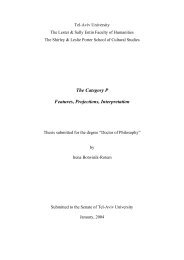How to Avoid a New Financial Crisis
How to Avoid a New Financial Crisis
How to Avoid a New Financial Crisis
You also want an ePaper? Increase the reach of your titles
YUMPU automatically turns print PDFs into web optimized ePapers that Google loves.
of rating agencies <strong>to</strong> assess a company’s riskiness. Not unlike central bankers, rating agencies<br />
find it easy <strong>to</strong> make small decisions that have small consequences. But when a change in rating<br />
can trigger enormous economic consequences, rating agencies cannot be relied on <strong>to</strong> make the<br />
right call. AIG was still rated AA two days before being bailed out by the government.<br />
Second, the regula<strong>to</strong>rs suffer from the rating agency problem in spades. There is no<br />
political payoff from an early intervention, especially given the uncertainty that surrounds all<br />
such decisions. After Washing<strong>to</strong>n Mutual was taken over, there were still people complaining<br />
that it was <strong>to</strong>o early <strong>to</strong> act. It is like fighting a preemptive war. There is no credit for the pain<br />
avoided, while there is plenty of blame for the pain inflicted.<br />
Thus, we believe that the crucial characteristic of any intervention mechanism is that it<br />
should be market driven, i.e., it needs <strong>to</strong> rely on the market’s ability <strong>to</strong> collect relevant<br />
information promptly. The problem is that the market has an incentive <strong>to</strong> collect information<br />
only if there is a payoff. If the debt is always bailed out, the market will be useless.<br />
What Is Systemic?<br />
<strong>How</strong> can we use the market, when the market knows that financial institutions will<br />
always be bailed out? The secret is in distinguishing between obligations that will always be kept<br />
safe and obligations that might not be. The economic logic behind TBIF is that financial<br />
institutions are highly interconnected through derivative and repo contracts and the default of<br />
one might trigger losses on the counterparties, producing further defaults. This cascade can<br />
occur not only for actual losses, but even for potential ones. To function properly the financial<br />
system needs <strong>to</strong> operate under the assumption that certain assets, such as deposits, are “worry<br />
free”, i.e., deposi<strong>to</strong>rs do not have <strong>to</strong> moni<strong>to</strong>r counterparty solvency. This belief saves a<br />
tremendous quantity of resources, permitting the system <strong>to</strong> operate more efficiently. But this<br />
belief can be supported only if the prompt and full repayment of “sensitive” or “systemically<br />
relevant” obligations is not in question. In this respect, even the risk of some minor bureaucratic<br />
delay in repayment can undermine confidence.<br />
Long-term debt, however, is non-systemically relevant. There is no reason for a large<br />
financial institution <strong>to</strong> hold debt in other financial institutions. This debt mostly resides in the<br />
6
















